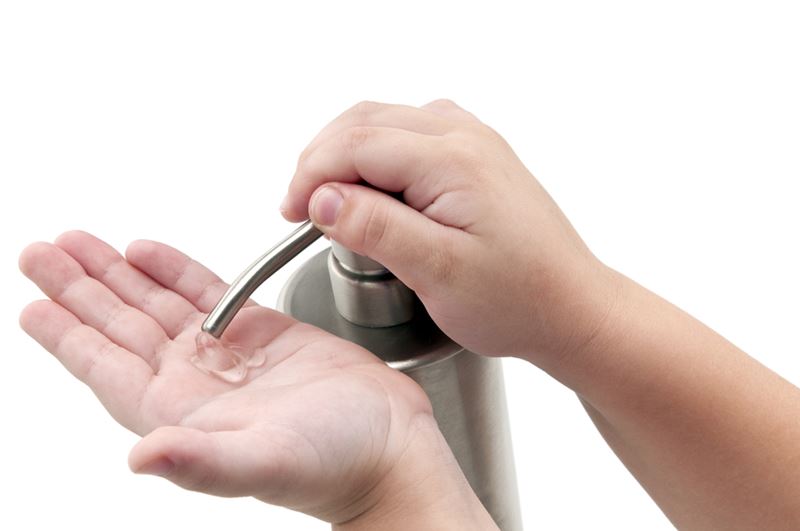Hand Sanitizers: Effectiveness and Risks for Children
The US Food Drug Administration (FDA) has recently issued an advisory alerting consumers against the use of hand sanitizer products manufactured by Eskbiochem SA de CV in Mexico. The FDA has also recommended Saniderm Products and UVT recall Saniderm Advanced Hand Sanitizer packaged in 1-liter plastic bottles and labeled with “Made in Mexico” and “Produced by Eskbiochem SA de CV.”
 The advisory was issued due to the potential presence of methanol (wood alcohol). Methanol is a substance that can be toxic when absorbed through the skin or ingested. Consumers who have been exposed to hand sanitizer containing methanol should seek immediate treatment to address the potentially toxic effects of methanol poisoning, FDA advised.
The advisory was issued due to the potential presence of methanol (wood alcohol). Methanol is a substance that can be toxic when absorbed through the skin or ingested. Consumers who have been exposed to hand sanitizer containing methanol should seek immediate treatment to address the potentially toxic effects of methanol poisoning, FDA advised.
The Centers for Disease Control and Prevention (CDC) has been recommending handwashing with soap and water to reduce the amounts of all types of germs and chemicals on hands. Due to the ongoing threat of the deadly coronavirus disease (Covid-19) worldwide, it is advisable for people, particularly the children and seniors, to keep their hands clean.
However, soap and water are not always available, especially in public places with no restrooms or washing facilities. As such, CDC has also advised the use of sanitizer with at least 60 percent alcohol to avoid getting sick and spreading germs to others.
Effectivity of Hand Sanitizers
According to the CDC, while it can quickly reduce the number of microbes on hands in some situations, alcohol-based hand sanitizers do not eliminate all types of germs. Alcohol-based hand sanitizers can inactivate many types of microbes very effectively when used correctly, however, people usually do not use a large enough volume of the sanitizer or nake the error of wiping it off before it dried.
Hand sanitizers also cannot remove or inactivate many types of harmful chemicals and are less effective when hands are visibly dirty or greasy. When hands are heavily soiled or greasy (a result after people handle food, play sports, work in the garden or go camping or fishing), hand sanitizers have reduced effectiveness. Handwashing, the CDC said, is recommended in such circumstances. Soap and water are also more effective at removing certain kinds of germs such as Cryptosporidium, norovirus, and Clostridium difficile.
Risk factors in Children
Hand sanitizers are cheap, easy to carry around, and are generally readily available. However, some reports have emerged which call attention to the risk of using hand sanitizer with children. “Many caregivers are unaware of the very high alcohol content present in alcohol-based hand sanitizers, which can contain up to 60% to 95% alcohol,” Cynthia Santos, MD, from CDC’s National Center for Environmental Health, said.
According to Santos, young children may inadvertently consume hand sanitizers because of their appealing scents, like apple, vanilla, and citrus. The CDC reported that from 2011-2015, US poison control centers received nearly 85,000 calls about hand sanitizer poisoning among children.
In an article published by Pharmacy Today, Greene Shepherd, PharmD, clinical professor at the University of North Carolina Eshelman School of Pharmacy, said younger kids are more susceptible to adverse effects from these products because there is not as much glycogen in their liver. The most common type of adverse health effects for both alcohol- and non-alcohol-based hand sanitizers include ocular irritation, vomiting, conjunctivitis, oral irritation, cough, and abdominal pain. Rare effects, on the other hand, are coma, seizure, hypoglycemia, metabolic acidosis, and respiratory depression.
Things to consider when using alcohol-based hand sanitizers to children
In an article in healthyenvironmentforkids.ca, the author, Erica Phipps, enumerated some things that parents and guardians of children should consider when using alcohol-based hand sanitizer:
– A single squirt of hand sanitizer the size of a dime is all that is needed
– Parents or guardians should dispense the product into their hands, then rub the surfaces of their children’s hands between theirs until fully dry (usually 10 to 15 seconds)
– Make sure that children do not lick the wet product off their hands
– Scented hand sanitizers, particularly those with fruity scents that may entice a child to ingest the product, should be avoided
– Make sure that children’s hands are dry (the product has evaporated) before giving children food or drink
– For hands that are still visibly dirty, wash as soon as possible with soap and water
The CDC suggests that hand sanitizers be stored out of reach of young children and used with adult supervision. Child-resistant caps can help reduce hand sanitizer-related poisoning among young children. Health care providers, including pharmacists, should also inform patients, parents, and caregivers of the potential dangers associated with alcohol-based hand sanitizers.
Handwashing with soap and water is still the gold standard in keeping your hands germ-free and clean. Apart from germs, dirt, and grease, harmful chemicals like pesticides and heavy metals can be washed off using soap and water. Handwashing helps prevent infections especially since people frequently touch their eyes, nose, and mouth (where germs can get into the body and make people sick) without even realizing it.
Handwashing also reduces the number of people who get sick with diarrhea by 23 to 40 percent; reduces diarrhea illness in people with weakened immune systems by 58 percent; reduces respiratory illnesses, like colds, in the general population by 16 to 21 percent; and reduces absenteeism due to gastrointestinal illness in schoolchildren by 29 to 57 percent.
Sources:
https://www.cdc.gov/handwashing/show-me-the-science-hand-sanitizer.html
https://www.pharmacytoday.org/article/S1042-0991(17)30602-3/pdf
https://www.cdc.gov/handwashing/why-handwashing.html
